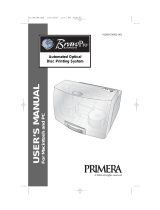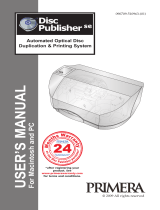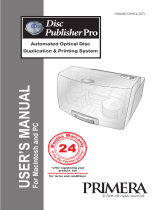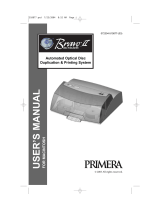Page is loading ...

091506-510975-(01)
USER’S MANUAL
© 2006 All rights reserved.
DISC AUTOLOADER
510975.qxd 9/28/2006 9:38 AM Page i

ii
Notices: The information in this document is subject to change without notice. NO WARRANTY OF
ANY KIND IS MADE WITH REGARD TO THIS MATERIAL, INCLUDING, BUT NOT LIMITED TO,
THE IMPLIED WARRANTIES OF MERCHANTABILITY AND FITNESS FOR A PARTICULAR
PURPOSE. No liability is assumed for errors contained herein or for incidental or consequential
damages in connection with the furnishing, performance, or use of this material. This document
contains proprietary information that is protected by copyright. All rights are reserved. No part of
this document may be photocopied, reproduced, or translated into another language without prior
written consent.
Trademark Acknowledgments: Windows is a registered trademark of Microsoft Corporation. All
other trademarks are the property of their respective owners.
Printing History
Edition 1.0, #091506, © Copyright 2006, All rights reserved.
FCC Compliance Statement: This device complies with part 15 of the FCC rules. Operation is subject
to the following two conditions: (1) this device may not cause harmful interference, and (2) this device
must accept any interference received, including interference that may cause undesired operation.
For Users in the United States: This equipment has been tested and found to comply with the limits
for a Class A digital device, pursuant to Part 15 of the FCC Rules. These limits are designed to provide
reasonable protection against harmful interference in a commercial installation. This equipment
generates, uses, and can radiate radio frequency energy and, if not installed and used in accordance
with the instructions, may cause harmful interference to radio communications. However, there is no
guarantee that interference will not occur in a particular installation. If this equipment does cause
harmful interference to radio or television reception, which can be determined by turning the
equipment off and on, the user is encouraged to try to correct the interference by one or more of
the following measures:
• Re-orient or relocate the receiving antenna.
•
Increase the separation between the equipment and receiver.
•
Connect the equipment into an outlet on a circuit different from that to which the receiver is
connected.
•
Consult the dealer or an experienced radio/TV technician for help.
Use of shielded cables is required to comply with the Class A limits of Part 15 of the FCC Rules. You
are cautioned that any changes or modifications not expressly approved in this manual could void
your authority to operate and/or obtain warranty service for this equipment.
For Users in Canada: This digital apparatus does not exceed the Class A limits for radio noise for
digital apparatus set out on the Radio Interference Regulations of the Canadian Department of
Communications. Le present appareil numerique n'emet pas de bruits radioelectriques depassant les
limites applicables aux appareils numeriques de la class A prescrites dans le Reglement sur le
brouillage radioelectrique edicte par le ministere des Communications du Canada.
CAUTION!
TO PREVENT FIRE OR SHOCK HAZARD, DO NOT EXPOSE THE UNIT TO RAIN OR MOISTURE.
TO REDUCE THE RISK OF ELECTRIC SHOCK, DO NOT REMOVE EXTERIOR PANELS. NO USER-
SERVICEABLE PARTS INSIDE. REFER SERVICING TO QUALIFIED SERVICE PERSONNEL.
OPERATE THE UNIT WITH ONLY THE PROPER ELECTRICAL SPECIFICATIONS AS LABELED
ON THE PRINTER AND AC ADAPTER.
CAUTION!
THIS PRODUCT CONTAINS A LASER DIODE OF A HIGHER CLASS THAN 1. TO ENSURE
CONTINUED SAFETY, DO NOT REMOVE ANY COVERS OR ATTEMPT TO GAIN ACCESS TO
THE INSIDE OF THIS PRODUCT. REFER ALL SERVICING TO QUALIFIED PERSONNEL. THE
FOLLOWING LABEL APPEARS INSIDE YOUR UNIT:
CLASS 1 LASER PRODUCT
LASER KLASSE 1
CAUTION!
USE OF CONTROLS OR ADJUSTMENTS OR PERFORMANCE OF PROCEDURES OTHER THAN
THOSE SPECIFIED HEREIN MAY RESULT IN HAZARDOUS RADIATION.
NOTE:
The optional DVD-R drive inside this product has laser diode(s) emitting below the limits of Class 3B.
NOTE:
This is a Class A product. In a domestic environment this product may cause radio interference in
which case the user many be required to take adequate measures.
510975.qxd 9/28/2006 9:38 AM Page ii

Table of Contents
Section 1: Getting Started..............................................................................1
A. Choosing a Good Location ................................................................1
B. Unpacking and Inspection.................................................................2
C. Identifying the Parts ...........................................................................3
D. System Requirements.........................................................................5
E. Overview of Operation ......................................................................5
Section 2: Hardware and Software Set-Up and Testing ..........................7
A. Software Installation...........................................................................7
B. Connecting the Cables........................................................................8
C. Installing the Disc Publisher Stand ................................................10
D. Installing the Disc Publisher ...........................................................11
E. Loading Media ..................................................................................12
F. Calibrating the Autoloader to the Disc Publisher........................13
Section 3: Running Your First Job..............................................................15
A. Burning and Printing Through PrimoDVD..................................15
B. Printing Only Using RoboPrint (Autoprinter Instructions) .......16
C. Changing Cartidges..........................................................................18
Section 4: Interpreting the Autoloader’s LED Status Lights................19
A. Power LED .........................................................................................19
B. Pause LED ..........................................................................................19
Section 5: Maintenance and Troubleshooting.........................................20
A. Cleaning the Case .............................................................................20
B. Technical Support..............................................................................20
Section 6: Technical Specifications............................................................21
Index..................................................................................................................22
iii
510975.qxd 9/28/2006 9:38 AM Page iii

There are interactive features that will allow you to jump
to different locations within the document. Each listing in
the Table of Contents is interactive. Place the cursor on
either the words or the page number. A small hand with a
pointing finger icon appears. Click on the line with the
icon and the document will jump to that page. If you want
to return to the Table of Contents, move the icon to the top
of the page and click on the arrow marked TOC.
Navigating through the Index is similar. Place the icon on
one of the listings or page numbers, click on it, and it will
move to that page. The text relating to the Index listing
will appear in red. Returning to the Index can be done by
clicking on the arrow marked Index.
Interactive Feature
in this PDF Document
Interactive.qxd 9/6/2005 3:30 PM Page 1

Getting Started 1
Section 1: Getting Started
THANK YOU…
...for purchasing the ADL-MAX. It is the perfect way for you to
add capacity to your existing Disc Publisher system.
To begin using your ADL-MAX, please read this manual
carefully. This Operator's Manual is a complete step-by-step
guide to quickly and easily copy discs with your new
ADL-MAX.
A separate User's Guide is provided with your Disc Publisher
that explains its operation.
NOTE ON TERMS AND CONVENTIONS:
From this point forward, the following terms and conventions
will apply:
1. The ADL-MAX will be abbreviated simply as the
Autoloader.
2. Optical discs, which can include many different types of
discs including CD-Rs, CD-RWs, DVD-Rs and more are all
referred to as CDs or discs.
A. CHOOSING A GOOD LOCATION
• Place the Autoloader in a location with adequate air
circulation to prevent internal heat build up. You'll need a
table-top with at least 28" (71.1 cm) of depth, and at least
28.5" (72.3 cm) of overhead space to allow the top cover to
open freely.
• Do not place the unit near heat sources such as radiators or
air ducts, or in a place subject to direct sun-light, excessive
dust, mechanical vibration or shock.
510975.qxd 9/28/2006 9:38 AM Page 1
INDEX
TOC

B. UNPACKING AND INSPECTION
Make sure that all supplied accessories are included with your
unit. The following items should be included:
• ADL-MAX
• Disc Publisher Stand
• 4 Gray Plastic Input and Output Bins
• Power Cord and Converter
• USB Cable
• Disc Publisher Mounting Pegs
• 2 Disc Publisher Stand adjustment Bolts and Washers
• Warranty Card
• This Operator's Manual, Quick Start Guide and Other
Printed Information
Save the carton and packing materials. They will come in
handy later if you ever need to transport the Autoloader
and/or any of its parts and accessories.
2 Getting Started
510975.qxd 9/28/2006 9:39 AM Page 2
INDEX
TOC

C. IDENTIFYING THE PARTS
Front Panel and Top
This illustration shows the Autoloader, its Control Panel,
Buttons, LED indicator lights, Input/Output Bins and other
components. A Disc Publisher Pro is shown with the unit so
that you can see where it is attached:
The Robotic Arm transports discs from an Input Bin, to a
CD/DVD Recorder, to the printer, and finally to an Output Bin.
The Control Panel contains LED Status Lights and Buttons to
manually control operation of the Autoloader.
The LED Status Lights indicate that Power is ON and when
the Pause Button has been pressed. They also blink in certain
patterns to indicate an error or other condition of the
Duplicator. See Section 4 for a full explanation of the LED
Status Light conditions.
Getting Started 3
Disc Publisher Pro
CD/DVD
Recorder Drives
LED Status Light
Pause Button
Control Panel
Input/Output Bins
Robotic Arm
Sequence Button
Power Light
Pick Button
Disc Publisher Stand
Reject Area
510975.qxd 9/28/2006 9:39 AM Page 3
INDEX
TOC

The Pause Button immediately pauses the motion of the
Robotic Arm. It is also used in combination with the Pick
Button to perform a reset on the robotics.
The Sequence Button moves the Robotic Arm from one
position to the next. It is used mainly during the set-up and
testing procedures.
The Pick Button is used to manually pick up a disc and to
drop it in a Bin, the CD Recorder or the Reject area. It is
also used in combination with Pause to perform a reset in
the robotics.
The Input/Output Bins are situated on pegs around the base of
the Autoloader. This is where you stack up to 100 blank discs,
which are to be recorded and printed. The far left bin is left
empty and will be the first output bin. The Autoloader will
then keep track of which bins contain blank media and which
bins will accumulate finished output.
The Reject Area is where discs are dropped if they do not pass
a software verification test. Discs simply drop in the left bin of
the Disc Publisher.
Rear Panel
This illustration shows the input ports found on the rear panel
of the Autoloader:
The Power port connects to a 12v 5 amp power converter.
The USB port connects to a standard 6' USB cable. Plug the
other end directly into a USB port on the back of your
computer.
4 Getting Started
Power Input Port USB Port
510975.qxd 9/28/2006 9:39 AM Page 4
INDEX
TOC

D. SYSTEM REQUIREMENTS
Please refer to the PC system requirements for Duplicator that
will be used with the unit.
NOTE: The ADL-MAX is not Macintosh compatible.
E. OVERVIEW OF OPERATION
The following is a description of the complete process of
copying and printing a CD job on your Autoloader:
1. Up to 300 blank discs may be loaded at one time. Each
Input/Output Bin will hold 100 discs. The far left
Input/Output Bin is left empty to be the first to collect
finished output.
2. The Autoloader has an integrated robotic arm that "picks"
one disc one at a time from an Input Bin.
3. CD Recorder Trays open automatically and the Robotic
Arm places a disc into each of the recorders.
4. All CD Recorder Trays then automatically shut.
Through software control, you can perform a verification test
on each CD-R disc before recording. If a disc does not pass
(meaning that all or part of that disc is not recordable), the
Robotic Arm picks it out of the CD Tray and sends it to the
Reject Area, in the left bin of the Disc Publisher.
5. The CD-Rs are now recorded. If you were to fill up each
CD with data, audio, video or music (650 MB), recording
time is about 3 ½ to 4 minutes each. DVDs recording time
is from 7-15 minutes depending on the speed of your
media. Most jobs don't fill the entire disc, so recording time
is usually less than this.
6. After recording, the Trays open automatically. The Robotic
Arm will transport the first disc to the printer. All others
will be transported to the Disc Publisher Output Bin
temporarily.
7. The Robotic Arm will now load the drives with blank
CD-Rs from an Input Bin to start recording the next round.
Getting Started 5
510975.qxd 9/28/2006 9:39 AM Page 5
INDEX
TOC

8. Once recording has started, the recorded discs from the
previous round will be transported to the Input Bin
temporarily, and will then be transported to the printer
for printing. This simultaneous recording and printing of
discs greatly increases the throughput of your Disc
Publisher.
9. After printing the first disc, the printer's CD Tray opens
automatically. The Robotic Arm transports the finished
CD-R to the Output Bin.
10. The process starts over and repeats until all blank discs are
gone or the number you have specified via software are
copied and printed.
11. As an Input Bin is emptied, it now becomes an Output Bin.
The Autoloader keeps track of which bins contain blanks
and which ones contain completed discs. For this reason
we do not recommend re-filling any empty bins while a
job is running.
12. When all the bins on the Autoloader are are burned and
printed the Disc Publisher will burn and print all the discs
in its own input bin just as it would during normal
operation.
Now that you understand the principle and the order of
operation, it is time to set up your unit. This is discussed in
the next several sections.
6 Getting Started
510975.qxd 9/28/2006 9:39 AM Page 6
INDEX
TOC

Hardware and Software Set-Up and Testing 7
Section 2: Hardware and Software
Set-Up and Testing
A. SOFTWARE INSTALLATION
Important Note: You must install the software for your Disc Publisher
before you install the ADL-MAX software.
The Installer Disc has a menu that will guide you through the
process of setting up your Autoloader. Please refer to the
following for more information on each step:
1. Place the Autoloader Installer CD in your CDRom Drive.
The Installer application should automatically launch in a
few moments. If it does, proceed to Step 2.
If it does not automatically launch, follow these steps:
• Double-click the My Computer Icon, then double-click
the icon of the appropriate CD drive containing the
Software Installer disc.
• Double-click Installer.exe
2. In the Installer Application, click the Standard Install
button. The on screen instructions will guide you step-by-
step through the installation process. To complete the
installation and setup you may follow the on screen
instructions or the instructions that follow.
510975.qxd 9/28/2006 9:39 AM Page 7
INDEX
TOC

8 Hardware and Software Set-Up and Testing
B. CONNECTING THE CABLES
• Remove the tape securing the arm to the base plate of
the Autoloader.
• Locate the power cord supplied with your unit.
• Plug the adapter into a surge protected outlet, and plug the
power plug into the power port on the rear panel of the
Publisher.
• Connect the unit to your PC with your beige USB Cable.
After a few moments, Windows will tell you it has found
new hardware and is looking for software to install it.
• Select "Install the software automatically" and click Next.
Power USB
510975.qxd 9/28/2006 9:39 AM Page 8
INDEX
TOC

Hardware and Software Set-Up and Testing 9
You may see a notice like the one shown here stating that
the software has not passed Windows Logo Testing. Click
Continue Anyway to continue installing the driver for your
Autoloader.
This driver will not appear as a printer. It will be found in
device manager under Universal Serial Bus controllers as
ADLMAX Driver.
510975.qxd 9/28/2006 9:39 AM Page 9
INDEX
TOC

10 Hardware and Software Set-Up and Testing
C. INSTALLING THE DISC PUBLISHER STAND
• Lower the Disc Publisher Stand onto the Autoloader so
that the metal tab on the stand overlaps the base plate and
the holes on the stand line up with the screw holes on the
base plate.
• Attach the appropriate mounting pegs to the stand.
Disc Publisher Pro
Disc Publisher II
510975.qxd 9/28/2006 9:39 AM Page 10
INDEX
TOC

Hardware and Software Set-Up and Testing 11
• Attach the stand to the unit using the adjustment bolts and
the washers. Do not tighten the bolts at this point!
D. INSTALLING THE DISC PUBLISHER
• Open the cover of the Disc Publisher.
• Lower the Disc Publisher onto the stand. The pegs will
correspond with the holes on the bottom of the unit. There
are several sets of holes on the bottom of the Disc
Publisher. The pegs fit in the front-most and outer most
set of holes.
510975.qxd 9/28/2006 9:39 AM Page 11
INDEX
TOC

12 Hardware and Software Set-Up and Testing
• Install the cables, ink cartridges etc. according to the
instructions in the Disc Publisher users manual. The
software for the Disc Publisher should have been installed
before starting the ADL-MAX setup.
E. LOADING MEDIA
• Load up to 100 discs in each of the bins. Place them on the
mounting pegs of the unit.
Note: Be sure the far left side bin on the Autoloader and Disc Publisher are
left empty.
• Load up to 50 discs into the right bin of the Disc Publisher
Pro and up to 25 discs in a Disc Publisher.
510975.qxd 9/28/2006 9:39 AM Page 12
INDEX
TOC

Hardware and Software Set-Up and Testing 13
F. CALIBRATING THE AUTOLOADER TO THE DISC
PUBLISHER
• Calibrate the arm to the Disc Publisher by opening the
PrimoDVD software or the RoboPrint Software. The
software will detect the ADL-MAX and prompt you to
calibrate. Follow the on screen instructions to calibrate
the unit.
You can recalibrate at any time by opening Primo DVD -
Click the robotics menu - select options - Click the Calibrate
ADL-MAX button. If you are using RoboPrint, click Robot
Options - Calibrate ADL-MAX.
Note: The first time you launch the PrimoDVD or RoboPrint software you
may be directed to a web page to download and install a firmware
update for your Disc Publisher or AutoPrinter. Follow the
instructions on the web page to complete this update.
510975.qxd 9/28/2006 9:39 AM Page 13
INDEX
TOC

14 Hardware and Software Set-Up and Testing
• After calibrating the Disc Publisher position by moving the
stand forward or backward, make sure you tighten the
mounting bolts to the stand.
510975.qxd 9/28/2006 9:39 AM Page 14
INDEX
TOC

Running Your First Job 15
Section 3: Running Your First Job
A. BURNING AND PRINTING THROUGH PRIMODVD
When the Disc Publisher is connected to the ADL-MAX the
cover must remain open at all times.
Run PrimoDVD jobs just as you normally would or according
to the instructions in the Disc Publisher users manual. Other
than the cover status and media loading there is no differences
in operation.
If you would like to disable the ADL-MAX but still leave it
connected you may do so via the Robotics Menu - Options.
Check the Disable ADL-MAX box. The Disc Publisher will
now only pick from its own bins while still on the stand with
its cover open.
Note: If the ADL-MAX is powered off, you must remove the Disc Publisher
from the stand to operate the Disc Publisher successfully.
510975.qxd 9/28/2006 9:39 AM Page 15
INDEX
TOC

16 Running Your First Job
You may also recalibrate the ADL-MAX by clicking Calibrate
ADL-MAX button. Several calibration options are available.
Last Disc calibration and Bin positions will only be necessary if
the Autoloader is having trouble picking from the bins. Follow
the onscreen prompts to calibrate the bins.
B. PRINT ONLY USING ROBOPRINT (AUTOPRINTER
INSTRUCTIONS)
When the AutoPrinter or Disc Publisher is connected to the
ADL-MAX the cover must remain open at all times.
To Print Only using an AutoPrinter or Disc Publisher you must
use the RoboPrint software. You can not print directly from
SureThing or any other graphics program. The robotics files
necessary for controlling and calibrating the ADL-MAX are
only included in the RoboPrint software. Follow these steps.
1. Design and save your label using SureThing according to
the instructions in your AutoPrinter or Disc Publisher
manual.
2. Open the RoboPrint Software
510975.qxd 9/28/2006 9:39 AM Page 16
INDEX
TOC
/





